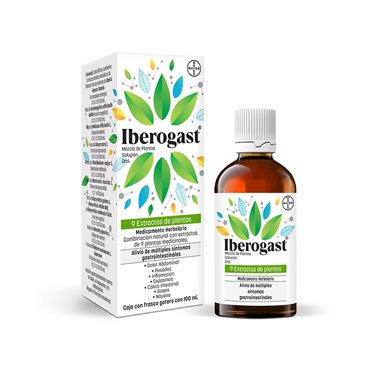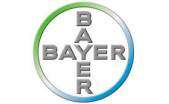Iberogast Oral Drops Solution 100 Ml
This medicine is indicated for the treatment of gastrointestinal disorders such as dyspepsia (digestion disorder) and gastritis (inflammation of the stomach), as well as for the relief of associated symptoms, stomach pain, abdominal bloating, flatulence, gastrointestinal cramps, nausea. and heartburn. Iberogast is indicated in adults and adolescents over 12 years of age.
This medicine is indicated for the treatment of gastrointestinal disorders such as dyspepsia (digestion disorder) and gastritis (inflammation of the stomach), as well as for the relief of associated symptoms, stomach pain, abdominal bloating, flatulence, gastrointestinal cramps, nausea. and heartburn. Iberogast is indicated in adults and adolescents over 12 years of age.
Iberogast (Oral Drops Solution 1 Bottle 100 Ml)
Ethanolic liquid extracts of white holm oak, angelica roots, chamomile flowers, caraway fruits, milk thistle fruits, lemon balm leaves, mint leaves, celandine, licorice root.
ACTION AND MECHANISM
- Combination of plant extracts with antispasmodic activity, increasing gastrointestinal tone, anti-inflammatory, carminative, antioxidant and antimicrobial.
INDICATIONS
- Treatment of digestive disorders, such as [DYSPEPSIA] or [GASTRITIS], as well as treatment of associated symptoms such as [NAUSEA], [GASTRALGIA], [FLATULENCE], [GASTRIC HYPERACIDEZ], [ABDOMINAL PAIN] or [SENSATION OF GASTRIC FULLNESS ].
POSOLOGY
- Adults and adolescents over 12 years: 20 drops, 3 times a day, before or during meals.
- Children under 12 years: not recommended.
Duration of treatment: if symptoms continue or worsen after 7 days of treatment, the doctor and / or pharmacist should be consulted. It is recommended to avoid treatments of more than 2 months without a doctor's recommendation.
DOSAGE IN KIDNEY INSUFFICIENCY
No specific dosage recommendations have been made.
DOSAGE IN LIVER INSUFFICIENCY
No specific dosage recommendations have been made.
RULES FOR CORRECT ADMINISTRATION
Shake the container before administration. Take accompanied with a little water.
CONTRAINDICATIONS
- Hypersensitivity to any component of the drug.
PRECAUTIONS
- Liver disease. Celandine has been linked to very rare cases of liver damage, including altered enzyme values, hepatitis, or failure. Assess the benefit / risk ratio in people with or history of active liver disease, including [HEPATITIS], [HEPATIC CIRRHOSIS], [HEPATIC INSUFFICIENCY], [ALCOHOLIC HEPATOPATHY] or in risk situations, as in [CHRONIC ALCOHOLISM] or patients treated with other hepatotoxic drugs (eg agomelatine, IFN, bosentan, nevirapine, pioglitazone, vildagliptin).
In case of symptoms of liver damage, such as nausea and vomiting, anorexia, asthenia, abdominal pain or dark urine, it is advisable to stop treatment and monitor liver function.
PRECAUTIONS RELATING TO EXCIPIENTS
- This medicine contains ethanol. It is recommended to review the composition to know the exact amount of ethanol per dose.
* Amounts less than 100 mg / dose are considered small and are generally not harmful, especially in children.
* Amounts greater than 100 mg / dose can be harmful for people with [CHRONIC ALCOHOLISM], and should be taken into account equally in pregnant and lactating women, children, and in high-risk groups, such as patients with liver disease ([HEPATIC INSUFFICIENCY ], [HEPATIC CIRRHOSIS], [HEPATITIS]) or [EPILEPSY].
* The amount of alcohol in this medicine (well below the 3 g / dose limit) is not expected to decrease the ability to drive or operate machinery, or interfere with the effects of other medications.
ADVICE TO THE PATIENT
- If the symptoms continue or worsen after 7 days of treatment, consult a doctor and / or pharmacist.
- Avoid treatments longer than 2 months without medical recommendation.
- Tell your doctor and / or pharmacist if you have any of these symptoms:
* Sharp and intense pain in the upper right part of the abdomen, nausea and vomiting, loss of appetite, unexplained tiredness, darkening of the urine or the appearance of a yellowish tint to the skin or the whites of the eyes.
SPECIAL WARNINGS
- If symptoms persist or worsen after 7 days of treatment, or the patient reports prolonged use of more than 2 months, the possibility of a more serious condition will be assessed.
- Monitoring:
* Liver function in patients with symptoms of liver damage.
INTERACTIONS
They have not been described.
PREGNANCY
There are no adequate and well-controlled studies in humans. Its administration is only accepted if there are no safer therapeutic alternatives, and the benefits outweigh the possible risks.
LACTATION
It is not known if it is excreted with milk, and the consequences it could have for the infant. Is recomended to suspend the lactancy or evy the administration.
KIDS
Safety and efficacy have not been evaluated in children <12 years of age, so it is recommended to avoid its use. Older teens can use this drug at the same doses as adults.
SENIORS
No specific problems have been described in the elderly.
EFFECTS ON DRIVING
They have not been described.
ADVERSE REACTIONS
Adverse reactions are described according to each frequency range, being considered very common (> 10%), common (1-10%), uncommon (0.1-1%), rare (0.01-0.1%) , very rare (<0.01%) or of unknown frequency (cannot be estimated from the available data).
- Allergic: very rare [HYPERSENSITIVITY REACTIONS], with [EXANTEMATIC ERUPTIONS], [PRURITO] or [DYSNEA].
OVERDOSE
Symptoms: no cases of overdose have been described.
Treatment: symptomatic.





